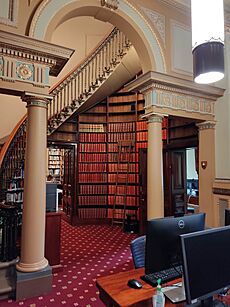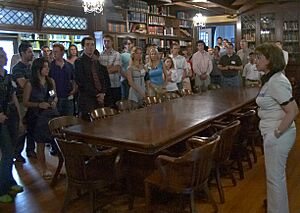Special library facts for kids
Imagine a library that doesn't have books on every single topic, but instead focuses on just one! That's a special library. It's a library that collects information all about a specific subject, like music, medicine, or even the history of a company.
These libraries are created for a specific group of people, like doctors, scientists, or artists, to help them with their work or research. You can find them in all sorts of places, such as hospitals, museums, government offices, and businesses.
Contents
- What Makes a Library "Special"?
- A Quick History
- Teamwork for Librarians
- Types of Special Libraries
- Corporate Libraries: For Businesses
- Law Libraries: For Legal Experts
- Federal Libraries: For the Government
- Medical Libraries: For Health Heroes
- Military Libraries: For Service Members
- Music and Performing Arts Libraries: For the Stage
- Transportation Libraries: For a World on the Move
- Museum Libraries: Treasures Behind the Scenes
- Other Special Libraries
- See also
What Makes a Library "Special"?

Special libraries are different from your school or public library. They usually focus on three main things:
- Special Collections: Instead of having a little bit of everything, their shelves are filled with books, documents, and other materials on one main topic. A music library, for example, would have tons of sheet music and recordings but maybe not many books about space travel.
- Special Users: These libraries serve a specific group of people. A library in a hospital is mainly for doctors and nurses, while a library at a car company is for the engineers and designers who work there.
- Special Services: Librarians in these places are often experts in the library's topic. They can help users find very specific information quickly. Sometimes they are called information centers because they are so good at finding answers.
While some special libraries are open to everyone, many are private. You might need to be an employee or a student at that place to use them.
A Quick History
The idea of libraries for specific groups has been around for a very long time. Even ancient libraries kept records of business and trade.
The idea of "special libraries" as we know them today became popular in the 1800s. As more fields like medicine and law grew, people needed libraries focused on those subjects. In 1909, a group of 20 librarians started the Special Libraries Association (SLA). This group helped librarians from different special libraries connect and share ideas.
Teamwork for Librarians
Librarians who work in special libraries have their own clubs and groups, called professional associations. These groups help them learn new things and share ideas about how to run their unique libraries.
The most well-known group is the Special Libraries Association. There are also groups just for law librarians, medical librarians, and music librarians, helping them become even better at their jobs. Some of these groups are:
- American Association of Law Libraries
- International Association of Music Libraries, Archives and Documentation Centres
- Medical Library Association
- Music Library Association
Types of Special Libraries
Corporate Libraries: For Businesses
A corporate library is a special library that works for a single corporation. It helps the company's employees find information they need for their jobs. This can help the company create new products and stay successful.
Law Libraries: For Legal Experts
Law libraries are built to help law students, lawyers, and judges. Their shelves are filled with books about laws and past court cases. Most are found in law schools or courthouses. The world's largest law library is the Law Library of Congress in the United States.
Federal Libraries: For the Government
In the United States, federal libraries are run by government agencies. The most famous one is the Library of Congress (LOC), which is like the nation's library. There are more than 1,100 federal libraries, serving everyone from government workers to members of the military. The LOC also helps all these libraries work together through a network called FEDLINK.
Medical Libraries: For Health Heroes
Medical libraries, also called hospital libraries, help doctors, nurses, and medical students. They have the latest information to help them treat patients and do research. Some hospitals also have separate libraries just for patients, filled with fun books to read while they get better.
Military Libraries: For Service Members
These libraries are on military bases to support soldiers and their families. They offer books for learning, professional development, and just for fun. They help service members relax and learn new skills. They also often keep records about the history of the military base.
Music and Performing Arts Libraries: For the Stage
These exciting libraries collect everything related to music, theatre, dance, and film. You can find sheet music, recordings of performances, costumes, posters, and scripts. They are a treasure chest for students, actors, and musicians. A great example is the New York Public Library for the Performing Arts, located right in the heart of New York's theater district.
Transportation Libraries: For a World on the Move
Ever wonder who plans our roads, bridges, and subways? They get help from transportation libraries! These libraries have information for engineers and city planners who design the ways we get around. They help make our travel safer and more efficient.
Museum Libraries: Treasures Behind the Scenes
Many museums have their own secret libraries! These are usually for the museum's staff and researchers to study the artifacts and art on display. While many are private, some, like the one at the Metropolitan Museum of Art in New York, are open for the public to visit and do their own research.
Other Special Libraries
There are many other kinds of special libraries, each with a unique focus:
- Theological Libraries focus on religion and history. They often hold very old and rare books that help people study the history of different faiths.
- News Libraries are like time capsules. They save old newspapers, magazines, and even web pages for future generations to read. An archive of newspapers is sometimes called a "hemeroteca."
- Physics Libraries are an example of libraries that focus on a single field of science, helping physicists with their research.
- Correctional Facility Libraries provide books and learning materials to people in correctional facilities. These libraries offer a chance to read and learn new skills.
See also
- Guy St. Clair
- One-person library
- Association of UK Media Librarians
 | Misty Copeland |
 | Raven Wilkinson |
 | Debra Austin |
 | Aesha Ash |


